#Black people enslaved by the church
Text
Introduction
For most of the past two millennia, Christian churches have not only accepted slavery, but have also participated in the slave trade and owned human property. The ethics of Christian slaveholding, however, have changed significantly. While Christians owned other Christians without controversy during the late ancient period, Christian churches began to forbid that practice over time. By the early modern period, it was considered taboo for Christians to own other Christians, although the practice sometimes continued illegally. While some individual Christians, including ministers and members of the clergy, questioned the legitimacy of slavery during the early modern period, it was not until the 18th century that a small minority of Christian churches began to assert an abolitionist stance.
Even then, it was deeply contested. For the majority of the early modern period, most Christian churches—both Catholic and Protestant—supported slavery and benefited from the institution. Even the Quakers (Society of Friends), who were leaders in the abolitionist movement, took a century to disown enslavers from their congregations. In the United States, many Christian denominations split on the issue of slavery in the 19th century, and Christian ministers and missionaries developed robust defenses of slavery based on Christian scripture and proslavery theology.
Enslaved and free Black Christians were the most ardent abolitionists, and they drew on scripture to support antislavery and abolition. While a significant amount of scholarship has debated whether Christian churches were pro- or anti-slavery, some of the most exciting research about the church and slavery has focused on why enslaved people became Christian and how they used the bureaucracy of the church to advocate for their rights and to protect their communities.
Much of this scholarship has emerged from a Latin American context, where archival records are more robust, but there are also important studies focusing on Black churches in the North America, especially the role of the African Methodist Episcopal (AME) and other African American–led churches. Within this area, scholars debate the meaning of conversion as well as the relationship between African religions and Black Christianity. Recent scholarship has emphasized that Africans and their descendants were not passive recipients of Christianity.
Rather, many enslaved men and women actively sought out baptism and used church institutions not only as a place of worship, but also as a way to protect themselves and their families. Another significant area of research has examined the relationship between the church, slavery, and race. Scholars have demonstrated how European Christians drew on categories of religious difference as they developed new racial categories. They have shown how categories like “Whiteness” and “purity of blood” were transformed within the context of slavery, as enslavers sought to reconcile slaveholding with Christian practice.
General Overviews
As Christian nations began to build empires across the Atlantic, the pope condoned the enslavement of Africans as long as certain conditions were met. A century later, Protestant nations followed Catholic lead in creating colonial slave societies in the Americas, although they developed different laws and practices related to slavery and Christianity. Blackburn 1997 provides an overview of the shifting relationship between slavery and Christian churches in European empires, while Davis 1966 is a classic study of slavery from Antiquity to the early modern period.
Over the past decades, scholars have sought to understand the history of the church and slavery from the perspectives of non-Europeans, especially Africans and Native Americans. Sanneh 2006 and Gray 2012 examine the history of Christianity in Africa, focusing on the role of African Christians. Johnson 2015 is a wide-ranging study of the relationship between African American religions (including Christianity), slavery, and colonialism, while Frey and Wood 1998 is an important survey of African American Protestantism in the British Atlantic world. Gin Lum and Harvey 2018 contains several essays relevant to the study of religion, race, and slavery. Reséndez 2016 explores the under-examined history of Native American enslavement.
Blackburn, Robin. The Making of New World Slavery: From the Baroque to the Modern, 1492–1800. London and New York: Verso, 1997. Blackburn examines the Old World foundations for American slavery. While not the focus of his study, Christian churches play a central role in creating a precedent and a legal justification for slavery in the New World.
Davis, David Brion. The Problem of Slavery in Western Culture. Ithaca, NY: Cornell University Press, 1966. The first in David Brion Davis’s classic trilogy about slavery and abolition. Davis examines the ancient history of slavery and traces the relationship between slavery and the church in Europe and the Atlantic world.
Frey, Sylvia, and Betty Wood. Come Shouting to Zion: African American Protestantism in the American South and British Caribbean to 1830. Chapel Hill: University of North Carolina Press, 1998. An important survey of Afro-Protestantism in British America and the early United States. Early chapters cover the history of Catholicism in Africa and the persistence of African religious traditions under slavery in the Americas. Later chapters cover Protestant missionary efforts, and the expansion of Afro-Protestantism after the Great Awakening.
Gin Lum, Kathryn, and Paul Harvey, eds. The Oxford Handbook of Religion and Race in American History. New York: Oxford University Press, 2018. An excellent edited volume with over thirty essays, covering race and religion from the colonial period until the 2020s. Several essays are relevant for discussions of the church and slavery.
Gray, Richard. Christianity, the Papacy, and Mission in Africa. Maryknoll, NY: Orbis, 2012. A posthumously published set of essays. Gray’s overarching argument is that African Christians played a central role in initiating papal interest and involvement in sub-Saharan Africa. Several essays touch on the history of slavery and the slave trade.
Johnson, Sylvester. African American Religions, 1500–2000. Cambridge, UK: Cambridge University Press, 2015. DOI: 10.1017/CBO9781139027038While not focusing exclusively on the church or Christianity, Johnson’s synthesis of five hundred years of African American religions is an indispensable study that traces the relationship between Black religion, slavery, racism, and colonialism within a transatlantic frame.
Lampe, Armando, ed. Christianity in the Caribbean: Essays on Church History. Kingston, Jamaica: University of the West Indies Press, 2001. A helpful overview of the relationship between the church and slavery in the Caribbean, with essays on Catholic and Protestant churches in different imperial and national settings.
Reséndez, Andrés. The Other Slavery: The Uncovered Story of Indian Enslavement in America. Boston and New York: Houghton Mifflin Harcourt, 2016. The history of Native American enslavement has long been under-examined, largely because indigenous slavery was illegal for most of colonial American history. This study does not focus on the church explicitly, but the relationship between Catholicism and Indian slavery is an important theme.
Sanneh, Lamin. “Christianity in Africa.” In The Cambridge History of Christianity. Edited by Stewart Brown and Timothy Tackett, 411–432. Cambridge, UK: Cambridge University Press, 2006. Sanneh’s survey traces the changing role of Christianity—both Catholic and Protestant—in West and East Africa, focusing on the role of Christian missions and the impact of slavery and colonialism
Abolition of Slavery
Michael Guasco, Matthew Wyman-McCarthy
Subject: Atlantic History »
Date Added: 2010-05-10
Abolition of SlaveryIntroductionThe abolition of slavery in the Atlantic world occurred during the 19th century, but its origins are generally recogni...
Abolitionism and Africa
Bronwen Everill
Subject: Atlantic History »
Date Added: 2016-02-25
Abolitionism and AfricaIntroductionFrom the beginning of the organized abolition campaigns in the Atlantic world in the 1780s, antislavery campaigners...
Africa and the Atlantic World
David Northrup
Subject: Atlantic History »
Date Added: 2010-05-10
Africa and the Atlantic World Introduction Africa from Morocco to the Cape of Good Hope experienced new contacts with Europeans during the...
African American Religions
Stefania Capone
Subject: Atlantic History »
Date Added: 2011-08-26
African American Religions Introduction Since its beginnings, the study of African American religions has combined anthropological and histori...
African Religion and Culture
David Northrup
Subject: Atlantic History »
Date Added: 2010-05-10
African Religion and Culture Introduction Africa has been home to a great variety of religious and other cultural practices and beliefs, i...
#Church and Slavery#White Lies#religion#Black people enslaved by the church#american slavery#world history
11 notes
·
View notes
Text
The 272: The Families Who Were Enslaved and Sold to Build the American Catholic Church
youtube
people want to pretend that this didn't happen so we got a little learning for you here
7 notes
·
View notes
Text

some supplemental reading where the Ken Burns documentary (severely) lacked
#it hinted at it danced around it but ultimately left me wondering for a genre of music#that was partly of not almost entirely rooted in blues and music song by enslaved people#and gospel music from Black churches#how are there hardly any Black people in the genre?#the statistics are SHOCKING#country music#black music action coalition
2 notes
·
View notes
Photo


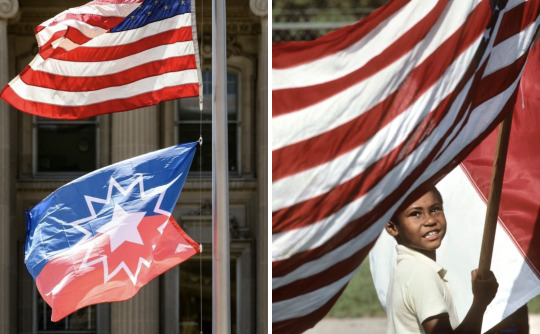


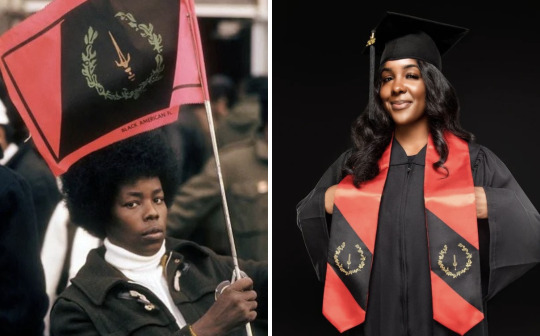
Juneteenth is a Black American holiday.
We call Juneteenth many things: Black Independence Day, Freedom Day, Emancipation Day, Jubilee Day. We celebrate and honor our ancestors.
December 31 is recognized as Watch Night or Freedom’s Eve in Black American churches because it marks the day our enslaved ancestors were awaiting news of their freedom going into 1863. On January 1, 1863, President Lincoln issued the Emancipation Proclamation. But all of the ancestors wouldn’t be freed until June 19, 1865 for those in Galveston, Texas and even January 23, 1866 for those in New Jersey (the last slave state). (It’s also worth noting that our people under the Choctaw and Chickasaw Nations wouldn’t be freed until April 28, 1866 and June 14, 1866 for those under the Cherokee Nation by way of the Treaties.)
Since 1866, Black Americans in Texas have been commemorating the emancipation of our people by way of reading the Emancipation Proclamation and coming together to have parades, free festivities, and later on pageants. Thereafter, it spread to select states as an annual day of commemoration of our people in our homeland.
Here’s a short silent video filmed during the 1925 Juneteenth celebration in Beaumont, Texas:
youtube
(It’s also worth noting that the Mascogos tribe in Coahuila, Mexico celebrate Juneteenth over there as well. Quick history lesson: A total of 305,326 Africans were shipped to the US to be enslaved alongside of American Indians who were already or would become enslaved as prisoners of war, as well as those who stayed behind refusing to leave and walk the Trail of Tears to Oklahoma. In the United States, you were either enslaved under the English territories, the Dutch, the French, the Spanish, or under the Nations of what would called the Five “Civilized” Native American Tribes: Cherokee, Creek (Muscogee), Chickasaw, Choctaw, and Seminoles. Mascogos descend from the Seminoles who escaped slavery during the Seminole Wars, or the Gullah Wars that lasted for more than 100 years if you will, and then settled at El Nacimiento in 1852.)
We largely wave our red, white and blue flags on Juneteenth. These are the only colors that represent Juneteenth. But sometimes you may see others wave our Black American Heritage flag (red, black, and gold).
Juneteenth is a day of respect. It has nothing to do with Africa, diversity, inclusion, immigration, your Pan-African flag, your cashapps, nor your commerce businesses. It is not a day of “what about” isms. It is not a day to tap into your inner colonizer and attempt to wipe out our existence. That is ethnocide and anti-Black American. If you can’t attend a Black American (centered) event that’s filled with education on the day, our music, our food and other centered activities because it’s not centered around yours…that is a you problem. Respect our day for what and whom it stands for in our homeland.
Juneteenth flag creator: “Boston Ben” Haith
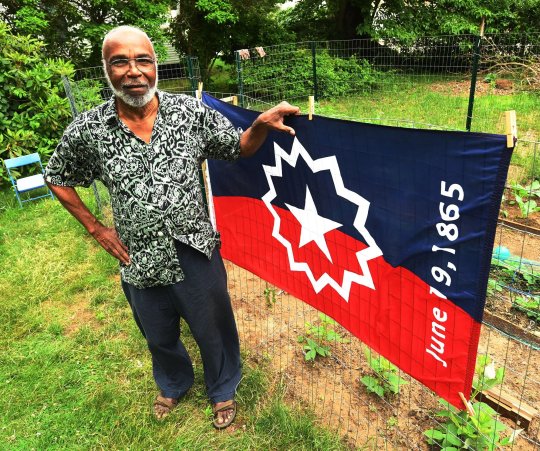
It was created in 1997. The red, white and blue colors represent the American flag. The five-point star represents the Lone State (Texas). The white burst around the star represents a nova, the beginning of a new star. The new beginning for Black Americans.
Black American Heritage Flag creators: Melvin Charles & Gleason T. Jackson

It was created in 1967, our Civil Rights era. The color black represents the ethnic pride for who we are. Red represents the blood shed for freedom, equality, justice and human dignity. Gold fig wreath represents intellect, prosperity, and peace. The sword represents the strength and authority exhibited by a Black culture that made many contributions to the world in mathematics, art, medicine, and physical science, heralding the contributions that Black Americans would make in these and other fields.

SN: While we’re talking about flags, I should note that Grace Wisher, a 13-year-old free Black girl from Baltimore helped stitched the Star Spangled flag, which would inspire the national anthem during her six years of service to Mary Pickersgill. I ain’t even gon hold you. I never looked too far into it, but she prob sewed that whole American flag her damn self. They love lying about history here until you start unearthing them old documents.
In conclusion, Juneteenth is a Black American holiday. Respect us and our ancestors.
#juneteenth#juneteenth flag#black american history#black american culture#ben haith#black american heritage flag#melvin charles#gleason t jackson#grace wisher#american flag#mascogos#juneteenth 2023
1K notes
·
View notes
Text
This is a little preview of my new series and yes, bunnies, this is a whole series from me. I hope everyone is ready for an erotic dystopia?
Decadent dystopian erotica with majestic dragons - second teaser for today
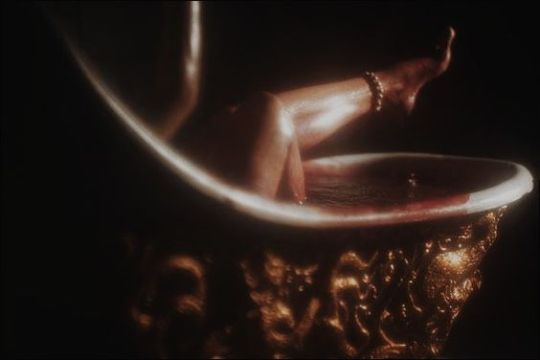
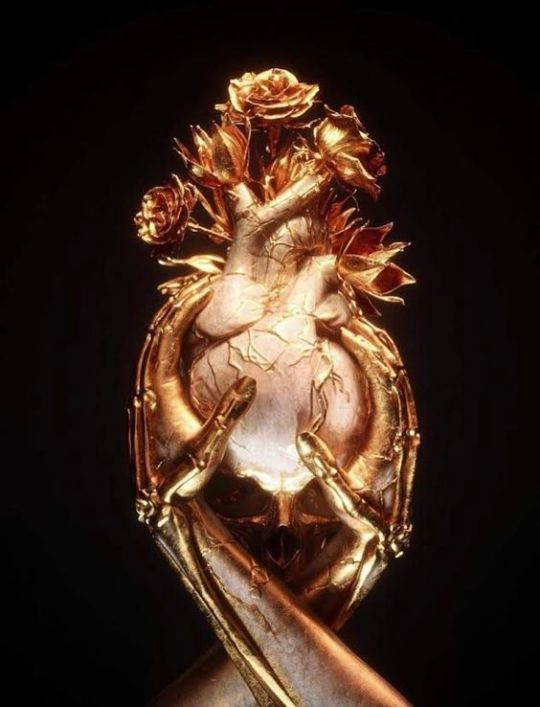
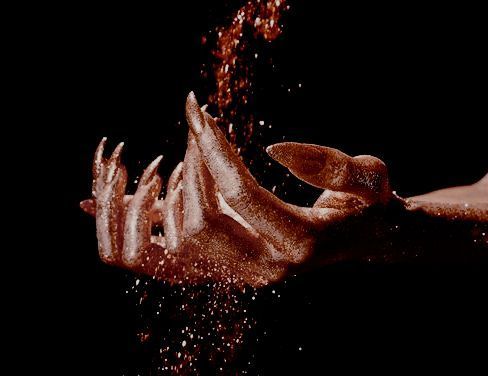
Glass House Ateez x reader
Everything changed in an instant.
The king was dead, and thousands of dragons took to the burning skies. The old world was over, and a 'new age' was in the making—an age of gods and monsters.
A thousand years ago, the fires of revolution blazed across the face of the world. Dragons—the creatures of ancient legends and children's fairy tales—reduced the once prosperous world to ashes in a matter of minutes. Rivers of black blood coursed through the veins of the streets, flooding the cities and lands in their wake. The sky was a blaze of purple flames and electric shocks. The church was reduced to rubble, and the royal family was executed in a public display. In the eyes of the dead, the unspoken horror in front of these majestic creatures remained forever, and in the sparks of the flames, they shimmered like precious sea stones.
There was a bitter smell of burning flesh and ash in the air. It was the smell of dreams on fire—the smell of a future in decay.
It was the beginning of the end of ancient life. The beginning of a new world. The Age of Immortality has begun.
All the legends turned out to be true; dragons did exist. They had always lived close to us, lurking in the velvety darkness of the night, waiting for the hour. Waiting for the hour to come when the power would be in their hands. Dangerous, unbridled, wild creatures of magic and the elements, predators at the top of the food chain. They had come into the world to rule, not to obey, and now, at long last, their time had come.
The world was at anarchy. Dragons were killing, raping, and enslaving races and lands as if it were an amusing child's game. They drank blood as black as the night from golden bowls, and they ate our succulent flesh as our bones cracked under the pressure of their razor-sharp teeth. They would hold orgies in the midst of the torn corpses and revel in their omnipotence. Those were the days of darkness. A time of terror, when the very word danger was a synonym for life itself. And so it went for several years, until the ultimate power fell into the clutches of the deadly Children of the Night, the oldest of all dragons.
The majestic Hala.
Eternal as the moon itself and deadly as the uncharted depths of the ocean, they inspired burning terror in all who encountered them. To their people, they were nothing more than a myth, a legend written on fragments of tablets. Forefathers, ancestors—they had hundreds of names, but each one inspired more fear than the last. They were predators among predators, bristling with animal dominance and primal, unbridled sexuality. They exuded power and sinfulness. They were the ones who defined the rules and set the boundaries of what was permissible.
With the arrival of Hala, a new phase in the history of the world began.
Humanity was enslaved, and dragons became the dominant species. As the years went by, the human population began to decline rapidly, with fewer and fewer humans, until "our" species reached the status of gatherers. Angelicus Nova, or Angel Stars, was what we came to be called. Human existence took on a strange religious orientation; we were worshipped, idolized, and adored, but despite all this, humans remained nothing more than a rare exchangeable currency, nothing more than an expensive trinket that was prestigious to own and could be broken with a flick of the wrist.
The human being also became one of the ways in which money flowed endlessly. These institutions were known as "glass houses." Gateway to heaven. They would be the equivalent of strip clubs or luxury escort houses if you and I were in the old world. The rules were the same: "Look, but don't touch." Girls and boys were expensive pieces of family jewelry that rested under the glass of fancy display cases. Our masters showed us off to the greedy eyes of the world with all the pride and ostentation that dragons have.
In spite of their possessive, animalistic nature, dragons were nothing more than swaggering bastards with inflated egos and delusions of grandeur.
Humans could be anything as long as dragons owned us—a muse, an innamorata, a nymph, an angel, a siren, or even a goddess—but like everything else in the universe, we came at a price.
The 'glass houses' were only in operation at night. During the day, all the 'jewels' rested and tidied up after tiring hours of contemplation of the world through the bluish glass of the display window. Nice, obliging workers in starched white collars were busy with the cleaning, scrubbing the baroque decorations of the vetrines with great care from a mixture of sperm, drool, and other secretions. You looked at it with an almost reverent awe, finding it disgusting to the point of bordering on the pornographically beautiful.
You could see it as real art—crude and original, but art nonetheless. There was something particularly mesmerizing about it, almost hypnotic, about the way the thick, pearly sperm dripped slowly from the golden flowers.
Of all the glass houses that ever existed, "Eros" was the most beautiful. It was the jewel in the crown of the New Empire, and you were its goddess. There were rumors that the Hala themselves were customers of 'Eros'. But rumors were only rumors. If they were ever to visit your 'home', you would know about it, for they would be where all men ended up—at your feet.
You were content with the life that you were living. There was no tragedy and no misery, no abusive family or abusive peers, no bullying and harassment at school—no, you had it all great. You were born here at Eros—the growth and blossoming of a beautiful flower. Your whole life has been within the confines of glass rooms and silk sheets, but unlike your dreamy friends, you weren't in need of rescue.
Your name is Aphrodite. Born in the radiance of the Creator. A goddess among goddesses, carved out of marble and mother of pearl. Your hair falls to the ground in waterfalls of pearls and silk. Your eyes are the eerie silvery moonlight in half-darkness, the deadly attraction of jewels in velvet lashes. Your lips are the succulent, juicy, forbidden fruit that every man would like to taste. The pain of your kiss is going to be the last pleasure of life.
You are not a delicate, pure lily; you are not a passionate, fiery rose; you are a narcissus reveling in the crystal of mountain waters. You love yourself to pain, to death, to despair, and in all the New Empire, there was none more beautiful than you.
Original sin. The primordial beauty. You are desire in all it manifests and begins to manifest.
The naked goddess, clad in snow-white fur like armor, is the goddess of love and ecstasy.
You've never been conceptualized; you've always been enigmatic.
You have been the object of worship. Your beauty has been sung in songs, and your love has been professed in a thousand languages. "Eros" was the site of visits from the mightiest and most powerful dragons of the New Empire. They all crawled at your feet, stroking their thick, greased with their cum cocks, greedily as they burned your skin with their golden gaze. They licked the deceptively thin glass of your display case with their long, sometimes split tongues, leaving muddy streaks on the perfect surface of the glass. The mighty and great dragons, unaccustomed to humiliation and submission, urinated like bitches in heat at the mere sight of your bare shoulders and long neck covered with diamond serpents, their eyes shining like stars in the twilight of your silken chambers. They would drip their sperm onto the icy marble floor until it collected in small, glistening puddles, and then they would lick it up as if it were the sweetest nectar in the world. Ambrosia in the truest sense.
Behind the glass walls of Eros, they were dominators, predators, and the rulers of this world through fear and pain, but here in this garden of Eros, they were nothing more than whores—shameless and needy. Slaves to your beauty, desperate to please you.
Their moans are always a delight to you. The moaning of your name.
The scenarios have been repeated to the point of being painful. Sugar-sweet subs with outstretched tongues and pretty, tear-stained faces. Dominant alphas with sweat-glistening skin and eyes rolling with pleasure.
Dragons fucked other dragons; orgies and bacchanals were staged; they were subjugated and subdued. They growled, moaned, squealed, and purred; some were fucked like a port slut, and some were licked for hours until they passed out from hyperstimulation. Some masturbated in front of your window, enjoying the fact that you were there to watch them, and there were others who would spend their heat and ruts in front of your window.
The list could go on and on: bondage, darkphilia, breeding, voyeurism, humiliation, objectification, and breathing games.
You were saturated with this game.
There were so many ways in which you could spend your evenings in the company of others. It was all designed to excite you, to make you beg, and to make you plead. Each of your visitors secretly hoped that one day you would strip off your luxurious furs and assume the position that was right for them—submissive, naked, and ready to accept whatever it was they were giving you.
It was an act of power; it was a position of strength, but here you were the strength. You were power.
No one would ever have the temerity to lay a hand on you. Goddesses are always untouchable.
You entertained yourselves by teasing them, mocking them, and fanning their flames of desire and passion. Dragons are creatures that are very dependent on their emotions and their desires; they feed on their power and their magic, but when they do not get what they want, it burns them from the inside; it breaks and crumbles them, like a cookie that has been bitten.
It was delicious, but you were full. Thank you, next.
You never denied that you were a sadist; you had a taste for pain; maybe it was a kind of revenge for the destruction of your family; maybe not. They came to you for that feeling; the dragons wanted to be punished and tamed, and the feeling of pain made them cum harder. As they say, Orgasm is a little death.
You could play this game for hours on end, letting the fur expose your boobs and pressing it against the cold glass as you went. It was magnificent—tall and plump, as if it had been milked with milk—with pink nipples the color of magnolia blossoms. There was something animalistically seductive about it—an appeal to their natural reproductive instincts—that evil thought of possible pregnancy. Their whimpering made you laugh, and the sounds they made were so sweet—desperate pleas and long, long moans.
"Let me taste you; I want it so much. I was a good boy, such a good boy."
There were other days when you would let your hands run over the bare skin of your thighs, leaving long red streaks that stood in erotic contrast to the silk of your pale skin. You smeared the clear, shimmering liquid of your juices along the line of your neck, in that most exciting place for dragons, where their teeth locked in a mating mark, as if branding their mate in the most perverse of affiliations.
"Tell me I belong to you; please say it. I'll do anything you don't want. Own me, use me; I want to be your toy.".
Sometimes other girls would be brought into your shop window to put on an erotic show. Exquisite nymphs and rosy-cheeked Lolitas would explore your tender skin with their soft, wet tongues, leaving traces of hungry kisses, until at last their lips would close on the most intimate spot between your thighs.
On days like this, the whole of 'Eros' would shake with furious, jealous growls and thunderclaps. Dragons were terrible possessive, and even though the "scene" itself would excite the hell out of them, the jealousy would burn through their veins from the inside out, like a deadly poison.
"You belong to me, and only to me. You are mine, mine and mine alone. I will tear this girl apart, and we will fuck in her blood until there are no more conscious thoughts left in your pretty little head, until you remember nothing but my name.".
But no matter what their words were to you, you didn't have a care in the world. Nobody would dare touch the goddess, and if they tried, they would not only lose their hands but also get killed.
That was the law of the New Empire—all the people who were left were protected and sheltered in an incredible way. There were very few of you, and if there had been any harm to even one of you, it would have been a real tragedy.
Only once has there been a breach of that law, and the consequences have been terrible. No one wants a repeat.
In any case, your life in the Garden of Eros was a pleasure. Maybe it was some kind of perverse way of looking at the world and love, but you didn't have any desire to change anything; everything was great.
Have you ever wondered if there might be another version of you out there? Perhaps, somewhere in a parallel universe, humans would still exist as the dominant species, their countries and cities would be prosperous, and you would be living a different life—a normal one. There, in that other universe, that other Aphrodite—no, not Aphrodite—you would have an ordinary name, not a divine one, something cute, something sweet, and always with a hint of shyness. It is probably there that you would have experienced your first love, that you would dream of a prince who would take you off into the sunset, and that "and they lived happily ever after." You would have been embarrassed to talk about sex, and you would have blushed horribly if his fingers had been in your knickers. But you weren't her. And she wasn't you. You don't want to be saved from sinning; you want to become one of them. You want to experience forbidden pleasures. You want to subjugate and dominate.
You're not in need of a prince; you've already had a king, or rather, eight kings. The day will come when everything you have ever dreamed of will come true, even if you haven't met any of the Hala yet.
You want power; you want to sit on a golden throne in a castle high up in the sky, and so it shall be. They say that love is a great strength, but they fail to mention that it is also the greatest weakness. And you, like no one else, know how to use it to your advantage.
This is not a pink fairy tale. There are no rainbow ponies pooping rainbows and eating fairy dust. No, this is a rotten world. It is full of debauchery, violence, and sex. You could say, "Come and rescue me. I'm waiting for you," but no, you have to rephrase it as "I'm waiting for you to crawl on your knees and lick my heels, and from that moment on, I will own you.".
Yes, that sounds much better.
It's already eight o'clock; time to get ready; you're leaving soon.
Ladies and gentlemen, welcome to the most famous glass house in the New Empire. Tonight we have wet aesthetic cunnilingus as our main course, and for dessert, a mind-blowing orgasm. You have a choice of starters. Drinks are on the house. We accept cash and checks. If you wish, you can leave a tip for one of our "jewels.".
Our hope is that your time at Eros will be an unforgettable experience.
#ateez smut#kpop smut#ateez x reader#ateez imagines#ateez fanfic#atz smut#smut#seonghwa smut#hongjoong smut#san smut#yunho smut#mingi smut#jongho smut#wooyoung smut#yeosang smut#seonghwa x reader#hongjoong x reader#mingi x reader#san x reader#wooyoung x reader#yunho x reader#jongho x reader#yeosang x reader#ateez unholy hours#park seonghwa smut#ateez fanfiction#ateez scenarios#ateez hard thoughts#ateez hard hours
252 notes
·
View notes
Text
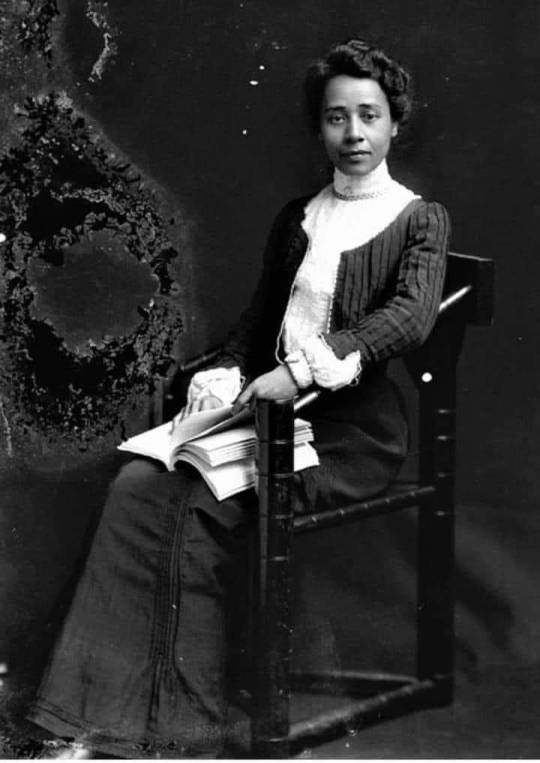
𝗔𝗡𝗡𝗔 𝗝𝗨𝗟𝗜𝗔 𝗛𝗔𝗬𝗪𝗢𝗢𝗗 𝗖𝗢𝗢𝗣𝗘𝗥 (1858-1964)
Anna Julia Haywood Cooper was a writer, teacher, and activist who championed education for African Americans and women. Born into bôndage in 1858 in Raleigh, North Carolina, she was the daughter of an enslaved woman, Hannah Stanley, and her owner, George Washington Haywood.
In 1867, two years after the end of the Civil Wàr, Anna began her formal education at Saint Augustine’s Normal School and Collegiate Institute, a coeducational facility built for former slàves. There she received the equivalent of a high school education.
Anna Haywood married George A.G. Cooper, a teacher of theology at Saint Augustine’s, in 1877. When her husband died in 1879, Cooper decided to pursue a college degree. She attended Oberlin College in Ohio on a tuition scholarship, earning a BA in 1884 and a Masters in Mathematics in 1887. After graduation Cooper worked at Wilberforce University and Saint Augustine’s before moving to Washington, D.C. to teach at Washington Colored High School. She met another teacher, Mary Church (Terrell), who, along with Cooper, boarded at the home of Alexander Crummell, a prominent clergyman, intellectual, and proponent of African American emigration to Liberia.
Cooper published her first book, A Voice from the South by a Black Woman of the South, in 1892. In addition to calling for equal education for women, A Voice from the South advanced Cooper’s assertion that educated African American women were necessary for uplifting the entire black race. The book of essays gained national attention, and Cooper began lecturing across the country on topics such as education, civil rights, and the status of black women. In 1902, Cooper began a controversial stint as principal of M Street High School (formerly Washington Colored High). The white Washington, D.C. school board disagreed with her educational approach for black students, which focused on college preparation, and she resigned in 1906.
In addition to working to advance African American educational opportunities, Cooper also established and co-founded several organizations to promote black civil rights causes. She helped found the Colored Women’s League in 1892, and she joined the executive committee of the first Pan-African Conference in 1900. Since the Young Women’s Christian Association (YWCA) and the Young Men’s Christian Association (YMCA) did not accept African American members, she created “colored” branches to provide support for young black migrants moving from the South into Washington, D.C.
Cooper resumed graduate study in 1911 at Columbia University in New York City, New York. After the death of her brother in 1915, however, she postponed pursuing her doctorate in order to raise his five grandchildren. She returned to school in 1924 when she enrolled at the University of Paris in France. In 1925, at the age of 67, Cooper became the fourth African American woman to obtain a Doctorate of Philosophy.
In 1930, Cooper retired from teaching to assume the presidency of Frelinghuysen University, a school for black adults. She served as the school’s registrar after it was reorganized into the Frelinghuysen Group of Schools for Colored People. Cooper remained in that position until the school closed in the 1950s.
Anna Julia Cooper dièd in 1964 in Washington, D.C. at the age of 105.
#anna cooper#black tumblr#black history#black literature#black community#black excellence#civil rights#black history is american history#black girl magic#blackexcellence365
89 notes
·
View notes
Text

Biddy Bridget Mason (1815-1891) was born into slavery and "given" as a wedding gift to a Mormon couple in Mississippi named Robert and Rebecca Smith. In 1847 at age 32, Biddy was forced to walk from Mississippi to Utah tending to the cattle behind her master’s 300-wagon caravan.
After 4 years in Salt Lake City, Smith took the group to a new Mormon settlement in San Bernardino, California in search of gold. Biddy Mason soon discovered that the California State Constitution made slavery illegal, and that her master's had a plan to move them all to Texas to avoid freeing them.
With the help of some freed Blacks, she and the other Slaves attempted to run away to LA, but they were intercepted by Smith and brought back.
Biddy had Robert brought into court on a writ of habeas corpus. She, her daughters, and the ten other Slaves were held in jail for their own safety to protect them from an angry and violent pro-slavery mob until the Judge heard the case and granted their freedom.
Now free, Mason and her three daughters moved to Los Angeles where they worked and saved enough money to buy a house. Biddy was employed as a Nurse, Midwife, and Domestic Servant.
She used part of her land as a temporary resting place for horses and carriages, and people visiting town paid money in exchange for the space. That particular area was considered the first "parking lot" in Los Angeles.
Biddy began a philanthropic career by opening her home to the poor, hungry, and homeless. Through hard work, saving, and investing carefully, she was able to purchase large amounts of real estate to help build schools, hospitals, and churches.
Her financial fortunes continued to increase until she accumulated a fortune of almost $300,000. In today's money, $6M. Her most noted accomplishment is the founding of the First AME Church in California.
I love the stories of the enslaved that work for their freedom and beat the oppressive system to become successful.
110 notes
·
View notes
Note
Not sure if this is the right place to ask this but I gotta start somewhere. I've been learning a lot about indigenous history and activism as I work on deconstruction, and a sentiment I come across a lot is bitterness towards Christianity. I cannot emphasize enough how much I fully understand. The rough bit is that sometimes when I read their work, I get the implication that there's nothing worth saving in the Church/Christianity- that to hold on to it is to hold on to all the colonialism and white supremacy and yuck.
As a disabled trans Christian, I get that, but it still hurts. I love God and am a Christian despite everything. I want to be an ally to indigenous people, but I want to follow God this way too. I know those aren't mutually exclusive, but it feels that way sometimes. Do you have any insight for me to find peace in this regard?
Thank you.
Hey there, thanks for the question, sorry for the delay!
This is something I've also wrestled with — a question I ask myself over and over, and probably always will. I cannot offer you peace, because as Jeremiah 6:14 says, "There is no peace!" — not while our faith continues to be wielded as a weapon against so many peoples. What I can offer you are some of the thoughts that have allowed me to continue to be Christian with hope that this faith can be better than what it's long been misused for, and the resolve to do my part to make it so.
First, that Christianity isn't unique in being co-opted by colonialist powers.
Any belief system can be twisted for violence, and many have been. If Christianity didn't exist, white supremacy still would — colonialist powers would have found a different belief system to twist into justifying their evils.
That absolutely does not absolve us from reckoning with the evils that have been done in Christianity's name! This isn't about shutting down critiques of Christianity with "uh well it could have been any religion" — as things played out, Christianity is the religion responsible for so much harm, and we need to acknowledge that and listen to groups who tell us how we can make some form of reparations.
But for me at least, there is some comfort in understanding that Christianity isn't, like, inherently evil or something. Recognizing that it isn't unique even in its flaws helps me look at the problem with clearer eyes, rather than wallowing in guilt and shame, if that makes sense.
Next, that there are Indigenous Christians, and Black Christians, and other Christians of color — that oppressed peoples have found things worth cultivating within Christianity! If they can find something worthwhile in this faith, it would be arrogance for me to deny it.
For instance, even when white slaveholders edited Bibles to remove too much discussion of liberation, even when white preachers emphasized verses about slaves being obedient to their masters, many enslaved people recognized how Christian faith actually affirms their equality and the holiness of their desire for liberation.
Black Theologian Howard Thurman opens his 1949 book Jesus and the Disinherited with a question asked to him by a Hindu man who knew the harms white Christianity had done to both their peoples: “How can you, a black man, be Christian?” The long and short of Thurman’s answer is that, in spite of the pain and exploitation too often inflicted by Christians in positions of power, the oppressed have always been able to see past that misuse of the Christian message to the true message lived out by Jesus Christ: a message of liberation for all.
For more thoughts on why and how to keep being Christian in spite, in spite, in spite...I invite you to look through my #why we stay tag.
___
How I wish that Christianity had never gotten tangled up in Empire! but it did, and it still is, and because for good or ill I cannot help that my spirit is stubbornly drawn towards the Triune understanding of the Divine, the best I can do is to use my privilege and what small influence I have within Christian institutions to move us towards decolonization. What some of that's looked like on the level of my personal beliefs:
I am firmly against any form of proselytizing. I don't support evangelism financially, I speak out against it, I don't platform it. (If someone wants to hear about my faith, they'll come to me — I don't run after them. And if someone does want to have that conversation, I aim to make it a dialogue, where we are learning from each other.)
I continuously work to recognize and uproot Christian supremacy within myself — the beliefs I didn't even realize where there until I started digging. That has included challenging any inkling within myself that Christianity is the "best" or "most right" religion. (One book that's helped a lot with that is Holy Envy by Barbara Brown Taylor.)
I seek wisdom from and relationship with Christians of color. Their insights are vital to our faith, and I try to use what small influence I have to uplift them.
On that last note, here are some resources I recommend as you continue to explore these questions:
This First Nations Version of the Christian Bible is gorgeously written, and a great way to explore scripture through a Native lens.
Native by Kaitlin B. Curtice is a lovely poetic memoir that explores how one person has sought to hold both her Christian faith and Potawatomi identity within herself. (She also has a new book out that I haven't read yet but really want to!)
God is Red: A Native View of Religion by Vine Deloria Jr.
Rescuing the Gospel from the Cowboys by Richard Twiss
I haven't read any of these 4 books but they look good too
This video with advice to non-Indigenous Christians
If anyone has any resources to add, please do!
105 notes
·
View notes
Text
Why is Aventurine Preservation-Imaginary?
(The real answer is, it's probably just HoYo filling out the path/element roster, but we'll play along!)
We'll tackle his element first. It's not the easier of the two, but it's the one with less info to sort through. The basic element types are:
Elements: wind, fire, ice, lightning
Sorta-abstract: quantum, imaginary
Physical: physical
It's a pretty funny system, all things considering. Here's Gepard, he can summon a massive wall of ice through will alone! Here's Dr. Ratio, he can make a massive tower just by thinking it into existence! Oh and here's Luka. Ordinary human. Pretty good at boxing.
(Not including Trailblazer here - probably the stellaron helps her swing that bat extra hard or something.)
And in the middle, you have Guinaifen, Hook, and Serval, who use the element but do not create it from scratch. For example, Serval is conceivably using electricity from her electric guitar.
Most of the elements are pretty self-explanatory, but Quantum and Imaginary are a bit more abstract. What are these types? What do they mean?
Quantum: technology, information, data, uncertainty
In my mind, Silver Wolf is the classic quantum character. She uses hacking to change data. In her hands, the data is always shifting. Fu Xuan is another direction that quantum can go - she's a diviner, and her job is peering into the future and making sense of the uncertainty. And then Qingque has elements of both: she works in divination, and also there is uncertainty in each hand of Celestial Jade.
Imaginary: Logic, abstraction, math/physics/metaphycs, theology
For some reason, Imaginary feels to me like dealing with the grand existential questions. There's Dr. Ratio on one end, knowledge is the measure of all things, and then there's Luocha with religious symbolism all over him, the devils, the church, the insanity in his character story, healing you with a cross necklace. Welt with his black hole - there's some kind of physics in there!
But this seems more like a philosophy than an element in battle. So in practice, what Imaginary characters have in common most of all is summoning miscellaneous objects 😅 black holes, dragons, chalk, etc.
So on that note, Aventurine fits right in, summoning dice and coins all over the place! Watch your he-ead~ 🎶🎵
I would've expected Aven to be Quantum. All the RNG in his kit. . . all the gambling, all the uncertainty. . . it seems more alike Qingque's tile suits. He even has card suits on his shields!
Perhaps the Imaginary is more about his character. Much of his story is intensely existential - what's the good of his blessing when everyone he loves is gone; why are we born if it's just to die. Perhaps he brings not just another answer, but a new way to see the question—not Why am I here, but All we have to decide is what to do with the time that is given us.
A more direct question that he himself discusses is why he's Preservation. We know he was offered the chance to become a Masked Fool, and seek Elation - the pursuit of happiness. Yet he turned it down.
As his alter-ego says, he and Preservation have nothing in common.
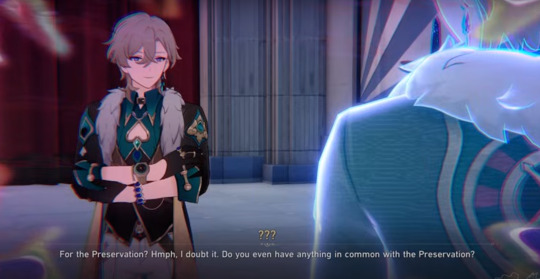
Interestingly, he also gives himself the answer.
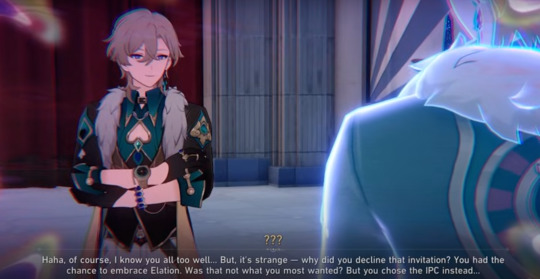
He didn't choose the Preservation. Aventurine chose the IPC.
But wait—aren't the IPC the bad guys?
It is fascinating to me when people make out the IPC to be the villain of this tale, or talk about him "escaping" the IPC as if he's being held hostage. Not only did he choose the IPC, he gambled everything, including his life, just for a sliver of a chance to join them.
They didn't kill his family, enslave him, brand him, or make him kill 34 other slaves. Certainly, the IPC has used Aventurine's talents and self-destructive behavior to their benefit, and is not particularly concerned with what becomes of him. They are big, corporate, and easy to hate. But they are also not the cause of his tragedy.
It's not the IPC, but rather the Katicans, that kill Kakavasha's family. His sister describes them as "bloodthirsty, cruel, and insatiably greedy." Personally I can’t say with confidence that the Katicans are villains without knowing their full history, but either way, the conflict is between the Avgins and the Katicans.
My feeling is that the IPC is amoral - they are not actively out to do harm, but neither will they go out of their way to avoid or prevent it. They are focused primarily on profit. Sometimes that means taking over a planet against the people's will. Sometimes that means making gambles. . . or sacrifices. Other times, it means hosting an Aetherium event.
So, why does Aventurine choose the IPC? What's interesting to me is, he isn't a slave to the IPC in any sense - not even in the lack-of-choice sense of Topaz's planet. He had a choice. He could have become a Masked Fool. So, why?
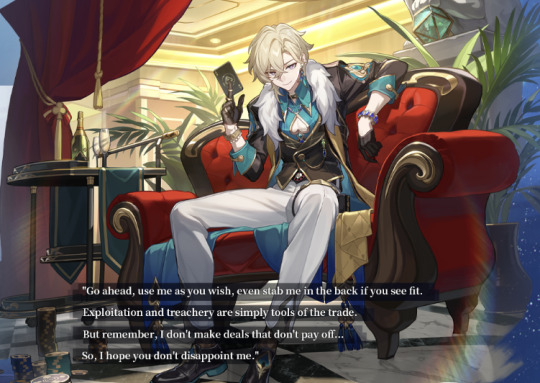
It all comes back to this:
"Go ahead, use me as you wish, even stab me in the back if you see fit. Exploitation and treachery are simply tools of the trade. But remember, I don't make deals that don't pay off... So, I hope you don't disappoint me."
The IPC is a tool to him, a means to an end. He expects that the IPC will use him, and in exchange he intends to use the IPC.
But to what end?
It's got to be something big. He could have become a refugee or an ordinary IPC employee, and instead he took the risk of lying about Tayzzynronth's remains. He let himself be arrested and brought to Jade. "I bet you won't send me to the gallows." Death was a possibility, so it had to be worth that risk.
My guess is that he wanted to save the Avgin people.
(And in this sense, Preservation is his true path after all.)
His sister tells him, "As long as you are alive, the blood of the Avgin will never run dry." Perhaps his goal was to save the remaining Avgin people, bring them away from the land of rock and sand and hardly any rain, and give them a home where they could prosper. Or to environmentally transform his home the way the IPC transformed other planets. To do that, he'll need more money and power than an IPC grunt's income. But with a Stoneheart's power, the IPC's money, and the Intelligentsia Guild's knowledge, he could make that happen.
(It feels off. It feels like too simple of an answer.)
But the Avgin people are all gone. Aventurine specifically says there aren't any left. Now that his reason is gone, what will become of him?
In a way, he does offer us an answer.
Aventurine: There will come a day when the sky will drizzle, and I will hear the call of Gaiathra Triclops and know that it is time for me to go and be reunited with my family.
Aventurine: So until the time comes... I should be preparing.
Kakavasha: Preparing for what?
Aventurine: Preparing to face them, Kakavasha, and to make them proud.
He will go on to live a good life. What form will it take?
I don't think he can ever completely shake off the responsibility of being the last surviving Avgin. It would be quite a leap for him to settle down and have a family, so perhaps he'll have to pass it forward some other way. Either by preserving the culture (another museum management event?) or by dedicating his wealth and power to saving other peoples.
The thing about being somewhere is, you can't help but grow into it, and it grows around you. And now, he has. . . allies who are a bit closer to friends than he might think.
He has two coworkers who willingly handed over their cornerstones for his plan—cornerstones more precious than life itself. He seems to genuinely look out for Topaz (advising her against getting involved in Belobog), and she talks about him cheerfully during 2.1. And I am sure that bringing him into the IPC was a significant personal risk for Jade, especially since he'd already caused the IPC a major financial loss. For Jade and Topaz, he has—if not their trust, at least their respect in his abilities.
And he has the Intelligentsia Guild's top Mundanite fussing over his survival. Not for the Avgin bloodline, and not for profit or the success of a mission. Acheron refers to Ratio as his “friend”, and he doesn’t bother to deny it.
He has three allies/maybe-friends involved in a grand scheme with him, and isn't there something addicting about scheming together? Something as marvelous as what the Trailblazer has with the Express? So, I don't think he'll leave the IPC anytime soon. He carved out this path with his bare hands, made a life and a purpose for himself, and even made some friends along the way. Now, it's time to live it.
49 notes
·
View notes
Text
In the shadows of a brutal era in American history, where oppression and cruelty reigned, a powerful form of resistance took root: the Praise House. For enslaved black individuals in the Antebellum South, the Praise House stood as a sacred sanctuary, a place where they could defy the oppressive Christian views imposed upon them by their slave masters.

In a world where the power structures dictated every aspect of an enslaved person's existence, the Praise House emerged as a symbol of defiance and strength. It became a space where faith, culture, and the indomitable spirit of the African diaspora could thrive despite the dehumanizing conditions of slavery.
Meetings in the Praise House were not confined to the familiar rhythms of Sunday mornings. Instead, these gatherings typically took place on weeknights, a subtle act of rebellion in itself. The slave masters preferred their human property to attend white-dominated churches, where carefully curated sermons served as a reinforcement of the slave system, often using scripture as a tool of control.
Within the walls of the Praise House, the enslaved black community found solace in the absence of opulent Christian symbols and trappings. There, empty space was favored over altars, kneelers, pulpits, and even chairs and pews. This minimalism provided the space needed for the powerful and spiritually charged "ring shouts," an integral part of the all-night sessions of prayer and song. These gatherings were more than just expressions of faith; they were acts of resistance, defiance, and a testament to the resilience of the human spirit.

Even in the most degrading conditions, religious life and practice served as a source of strength and unity for the slave community. The Praise House became the focal point of their lives on the plantations, a place where their identity was preserved and their spirits were nurtured.
As time passed and the shackles of slavery fell away, the significance of Praise Houses remained unwavering. They continued to serve as the heart of the African community, a testament to the enduring strength of culture and faith.
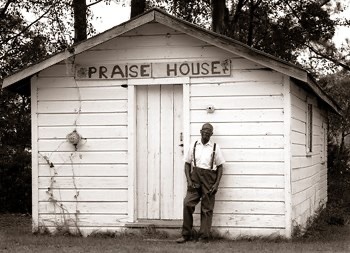
Today, we at My Mind and Me Inc and the Temple of Living Word a 501c3 non profit based in Atlanta are on a mission to rekindle the traditions of the past and return to our Southern hoodoo roots. Our goal is to open our own Praise House in Atlanta, where hoodoos, practitioners of African Traditional Religions (ATRs), and individuals of all backgrounds can practice openly, without judgment. In this sacred space, we will offer open altars, prayer sessions, spaces for practitioners to teach, and, of course, the continuation of the cherished tradition of ring shouts.
To make this vision a reality, we need your support. Be a part of a bigger picture, a story of resistance and resilience. Donate today and help us build a Praise House that stands as a testament to the enduring strength of culture, faith, and unity. Together, we can create a space where souls find solace, healing, and renewal.
Join us on this sacred journey, and be a part of history.
Please SHARE! SHARE! SHARE!
Atlanta family TAP IN
@mymindandmeinc @realconjuhwoeman
#hoodoo#medium#ancestor veneration#witch#rootwork#black women#conjure#prophet#tutnese#luxury#gofundme#nonprofit#healing#donate
106 notes
·
View notes
Text
Let's talk about the whole "natural order" thing

Something I have realized is that a ton of people are not quite aware of the context of the one idea that the bad guys within Castlevania: Nocturne keep bringing up again and again: The natural order.
If you watch the show you will find that no episode goes by without a bad guy bringing up that idea every other scene, so let this history nerd quickly explain that concept.
So, this entire idea came from two sources: Enlightenment, and the pre-capitalist, colonialist system.
You need to understand that from the 4th century till the 16th century usually most stuff got explained to people with "because it is God's will". Why is that person poor, and that person rich? Because it is God's will. Why is that guy the king? Because God had made him. Why do we have this war? Because God wants us to.
That does not mean that the people in power actually believed that, but they could get away with everything by having some arch bishop or even the pope agree with them. (I mean, just look at the crusades.)
But then things happened. Gutenberg invented the printing press. Folks read the bible for themselves. People started to get more literate in general. Information about science got wider spread. There was splintering within the church. And people were just not as willing to accept "because God" anymore.
At the same time we had just as bad (if not at times worse) differences in quality of life between rich and poor than in the middle ages. And of course we had the entire colonialism happening, that also included genocide and slavery. And this needed justification. Que: The natural order.
This was just the umbrella under which so much pseudo-science would pressed underneath at the time. A pseudo-scientific explanation for everything that was happening.
Why are some people richer than other? Because they are just naturally more suited to be rich. That is the natural order.
Why do we have a king? Because it is a human need to have one central leader. And that family were always kings. It simply is the natural order of things.
Why do we subjugate the people in America? Because it is just natural for advanced civilizations to subjugate other civilizations. It is actually good for them. It is the natural order.
Why do we enslave Black people? Because they were actually born to be servants. That is their natural state. It is the natural order.
The entire stuff with phrenology and eugenics and all of that came from this specific idea. Of a natural order. Like, racism and all that came from that. Manifest destiny. All of that was connected to this idea of a natural order.
Ironically, while this sprang from the need to take the religion out of the stuff, they then just fitted religion right back in. Making the "church being excempt from everything" also as part of "natural order".
And yes, this is still very much the idea that a lot of conservatism is build around. That there is this pseudo-scientific idea of "this has proofen to work this way before, so it should work like that forever, that is only natural".
Funnily enough those new atheist scientist dudes also LOVE to appeal to the natural order. At times literally. Because they are also really big at conservatism when it comes to women, and keeping cultures apart, and anti-queerness and all of that. And yes, they are gonna appeal to the natural order and it being natural. Somethin that has only been brought up and seen critically recently.
But of course religious conservatives also love to use that, too. Because not all of them have the guts to just keep saying "but God" to defend their position (and sometimes they even know that their stuff directly contradicts the bible). And then they will also go: "But it is natural!"
It is a shitty idea. That is where it came from. It was what a lot of people used to argue against a lot of change that was happening in the 18th and 19th century.
#castlevania#castlevania nocturne#castlevania netflix#history#colonialism#anti racism#discrimination#oppression#classism#french revolution
121 notes
·
View notes
Text

Abstract
The British did not initiate, but they came to dominate the Atlantic slave trade. Few expressed moral or ethical doubts about slavery. The Anglican church, was directly involved in slavery. When a Christian voice was raised against the slave trade, it was led by Quakers who also played a critical role in the campaign to end the slave trade.
Recommended Citation
Walvin, James (2008) "Slavery, the Slave Trade and the Churches," Quaker Studies: Vol. 12 : Iss. 2 , Article 3.
Available at: https://digitalcommons.georgefox.edu/quakerstudies/vol12/iss2/3
#Slavery#the Slave Trade and the Churches#Black People Enslaved by the church#white lies#religious lies#slavery and ecoomics
0 notes
Note
Hi! Just a quick question, since I noticed this is a fairly new one in the "Halsin discourse" (god, I hate like that's even a thing): what do you think of the opinion that Halsin, supposedly, "fetishizes drows while being racist to them at the same time"? And yeah, I know this may sound crazy: just copying what I read.
Oh trust me, I've seen it and.
Ugh.
So first of all: Halsin's problem isn't with Drow. It's with Lolth-sworn Drow. And I've seen people rebut "but THAT'S still religious discrimination!"
But it's not. It's more akin to someone being kidnapped by a death cult, then despising the entire cult. If your church is "the church of breaking peoples' fingers" and you break someone's fingers, it isn't religious discrimination for that person to then say "I do not like the members of the church of breaking peoples' fingers, and I do not trust that members of the church of breaking peoples' fingers will not break my fingers." Like. There is no "oh but not every Lolth worshipper believes in murdering and enslaving people" here.
I also resent people trying to compare the Drow to people of color*. The Drow, who practice slavery, who abduct others into lives of slavery, who sadistically torture those they believe to be racially inferior to themselves (LIKE WOOD ELVES), who want to conquer the entire world in the name of their goddess... aren't black-coded. They are white colonizer coded, and Halsin, who was enslaved by these white colonizers, has every right not to trust his oppressors.
Halsin fetishizing Drow based on him having one sexual encounter (possible two if the player is Drow) is so insane that I almost admire it- it's just short of a Chewbacca defense. But no, Halsin shows no signs he "fetishizes" Drow. He shows signs that he is open to sexual and/or romantic relationships with Drow who, you know, don't want to enslave and rape him.
Worth noting. The Drow twins are Seldarine Drow. They don't belong to the religion that orchestrated Halsin's rape and enslavement. That probably has a thing or two to do with Halsin's willingness to trust them, just saying.
So all that to say: Halsin distrusting the cult that oppressed and enslaved him while respecting those who don't follow those tenets is not racism. It's called being anti-slavery and anti-colonizer.
Thanks for the question anon!
One more note: I've never seen a single person who calls Halsin a Drow-racist/fetishizer take issue with Astarion's treatment of gnomes.
*When done in the story. I am aware that the developers used anti-black stereotypes and caricatures when making the Drow; I'm referring here to their role in the story
55 notes
·
View notes
Text
Praise houses
Praise houses were small, wooden structures used for worship by enslaved people in the American Southeast. They were also known as prayer houses. Praise houses were typically built within plantation complexes. They were often an elder enslaved individual's cabin.

Praise houses were a part of the early history of the Black church. There is evidence of Christian practice and praise houses from before the first organized Black denominations.
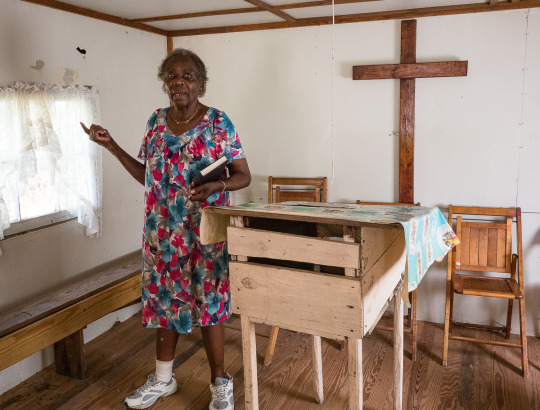
In praise houses, enslaved African Americans held religious services, shared news, and settled disputes. Services were typified by singing, prayer, and the "shout," which was a song accompanied by vigorous hand-clapping and dancing. As an act of resistance, congregants would gather in circle to stomp or shout upon the wooden floors, performing what was known as the Ring Shout.
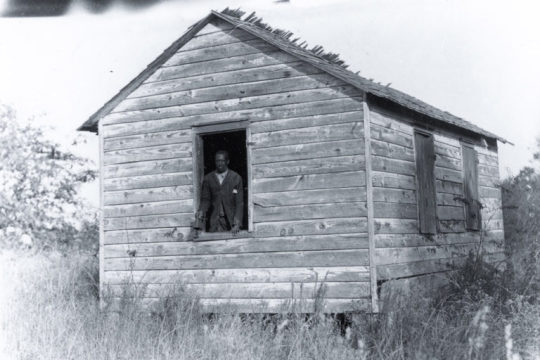
These gatherings were not only religious but also a form of resistance and a means of preserving cultural and spiritual traditions in the face of oppression.
youtube
"The true shouť takes place on Sundays or on 'praise'-nights through the week, and either in the praise-house or some cabin in which a regular religious meeting has been held. Very likely more than half the population of the plantation is gathered together. Let it be the evening, and a light-wood fire burns red before the door to the house and on the hearth.… The benches are pushed back to the wall when the formal meeting is over, and old and young, men and women, sprucely-dressed young men, grotesquely half-clad field hands—the women generally with gay handkerchiefs twisted about their heads and with short skirts, boys with tattered shirts and men's trousers, young girls barefooted—all stand up in the middle of the floor, and when the 'sperichil' is struck up, begin first walking and by-and-by shuffling round, one after the other, in a ring. The foot is hardly taken from the floor, and the progression is mainly due to a jerking, hitching motion, which agitates the entire shouter, and soon brings out streams of perspiration. Sometimes they dance silently, sometimes as they shuffle they sing the chorus of the spiritual, and sometimes the song itself is also sung by the dancers. But more frequently a band, composed of some of the best singers and of tired shouters, stand at the side of the room to 'base' the others, singing the body of the song and clapping their hands together or on the knees. Song and dance are alike extremely energetic, and often, when the shout lasts into the middle of the night, the monotonous thud, thud of the feet prevents sleep within half a mile of the praise-house."
— New York Nation, May 30 , 1867
54 notes
·
View notes
Text
How genealogy is used to track Black family histories
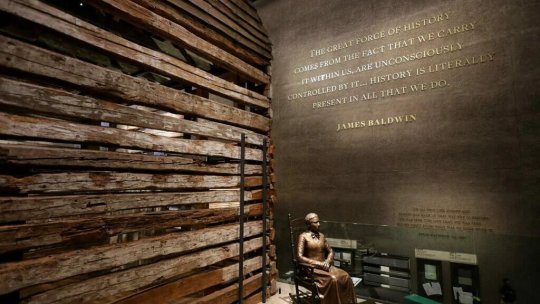
Our names are important to us. They tell us who we are and often, who we come from. So imagine suddenly discovering the last name you’ve always carried… might not actually be the name you should have.
Alex Neason began looking into her family’s history after discovering her great grandfather’s name was different from what she believed for her whole life. In her search to discover the story of that last name, she enlisted genealogist Nicka Sewell-Smith.
For Black Americans, genealogy can fill in the blanks left by the legacy of slavery and racism in the U.S. Services like the Freedmen’s Bureau and Slave Voyages provide free access to records and documents to help with that search. We talk about the power of genealogy in fostering knowledge and connection for Black Americans.
Source
If you click on the word “source,” it’ll take you to the article where you’ll see a LISTEN button. It’s a 30-minute audio that discusses the info provided in the article even further. Y’all know I’m big on getting people to trace their lineage. All that “we don’t know where we come from.” Who told you that? Everything in the US is in plain sight. Everything.
Discover your fam.
I assist others when they reach a roadblock, like getting past the “1870 wall.” But you can’t beat the feeling of you discovering them on your own. Unearthing your history, seeing photos, reading stories that were stored, and saying their names that haven’t been said for centuries. I’ve been tracing mine (scanning, logging) since my family reunion in 2005 through oral family history and obituaries (those are records), and since 2011 through databases of US archived records like ancestry.com (purchased by BlackStone) and familysearch.org (free database owned by the Latter-day Saints Church). There are others, but those are the main two I use for comparative results.
Archiving Centers, Census Records & Other Records
There are archiving centers in every state and DC that also keep records for those particular states and the federal capital. There’s a footnote on all records that tells you where they are housed. And please...Don’t just do a simple pedigree chart of your family tree. Get to know your great-aunts, great-uncles and cousins. It’s also helpful for seeing who lived around who (fam often lived next door to each other) and puts more of the pieces together of your complete family story. You can see the land and acres they owned or your fam today still owns, as well as if that land was stolen from them.
US census records go back to year 1790. Depending on when or if your ancestors were enslaved or free: you’ll find them attached to slave logs that have been made available online or kept in archiving centers (you go there), or or they’ll be listed on census records as free persons (1790-1710), free colored male/female (1820-1840), Black (1850-1920), Mulatto (1850-1890, 1910-1920) or Negro (1900, 1930-1950). “New” census documents are put on sites, like ancestry.com, every 10 years. As of 2023, you can only trace from 1950 to 1790. The 1960 census will be out in 2030. How to trace from 1950 to today, birth, death and residential records. So again, depending on the census year, you’ll notice your ancestors racial classification change throughout documents for obvious reasons.
Keep in mind that the the largest slave trade for the United States was the domestic slave trade. In house human trafficking and selling (in addition to property insurance of enslaved people and the selling of enslaved people as the building block of Wall Street’s stock exchange) is how US capitalism was built. So just because you know a lot of your people are from Tennessee, for example, it doesn't mean that’s where that line stayed. I’ve found my ancestors throughout 7 states (so far). Another example, people with Louisiana roots damn near always have ancestors who were trafficked from early Virginia. Going beyond year 1790, records were kept in Christian and Catholic churches and old family history books so most of those documents are scanned online and/or still kept in the churches. I’m talking books books.
If your ancestors walked the Trail of Tears, or were caught as prisoners of war or trafficked to Indian Nations to be enslaved, you’ll find an Oklahoma Indian Territory and Oklahoma Freedmen Rolls section on ancestry.com. You can discover more info on sites, like the Oklahoma Historical Society. (Every state has its own historical society for archived genealogical records.)
Here’s the National Archives.
Also for Oklahoma, you may also find your ancestors in Indian Census Rolls (1855-1940) as [insert tribe] Freedmen, depending if they weren’t rejected through the “blood quantum” Dawes Rolls for not being the new light to white status. You’ll see their application and the listed questions & answers with or without a big void stamp. And on the census, you’ll even see the letter I (pronounced like eye) changed to the letter B. This is also for those in Louisiana.
Freedmen’s Bureau & Bank Records
There were Freedmen’s Bureau records and Freedman’s Savings Bank records in other states. To see if your ancestors had their records in those systems, you can search by their name. The state and age will pop up with people having that name. It’ll give you a wealth of other info, like all of the kids and other fam if they were present or mentioned to the person who logged that info in. With the Freedmen Bank records, you can see how much money your ancestors put in there (that was later stolen from them by way of the United States government), which is still there today. It’s the biggest bank heist in US history (that they try to keep hush hush) with the equivalence of more than $80 million in today’s value stored in there today. Back then, it was valued almost close to $4 million. Stolen wealth met with bootstrap lectures.
Here’s a short video on that heist:
youtube
Today the bank is called the Freedman's Bank Building, located right on Pennsylvania Ave. Plain sight.
Trace your lineage.
There’s a lot more that I can list. But this is just the basics. Like I said before, it’s a more rewarding feeling when you discover your ancestors by yourself. You may reach roadblocks. Take a break. Try going the “Card Catalog” route on ancestry.com’s search engine. Don’t skip the small details.
SN: Slave Voyages isn’t a genealogical site, but rather a database for slave ship logs and the estimates of purchased Africans who became human cargo to be enslaved by country like USA, or by colonizers like Spain, Great Britain, etc.
#black americans#genealogy#lineage#ancestry#census records#freedmen's bureau#freedman's bureau#freedmen's bank#freedman's bank#american heist
153 notes
·
View notes
Text
florida now has to teach that enslaved people benefited from slavery because they learned valuable job skills. this is a real thing.
Much of the scrutiny surrounds a particular standard requiring middle school students to learn “how slaves developed skills which, in some instances, could be applied for their personal benefit.” But there are also objections to lessons that classify acts of violence perpetrated “against and by” African Americans, like the Ocoee Massacre of 1920, when a white crowd burned Black homes and churches to the ground and killed Black residents in a small Florida town enraged by a Black man attempting to vote.
this is the reason that conservatives want to control school boards and local legislatures. this will be national policy in 2024 if they're permitted to exert their will.
112 notes
·
View notes